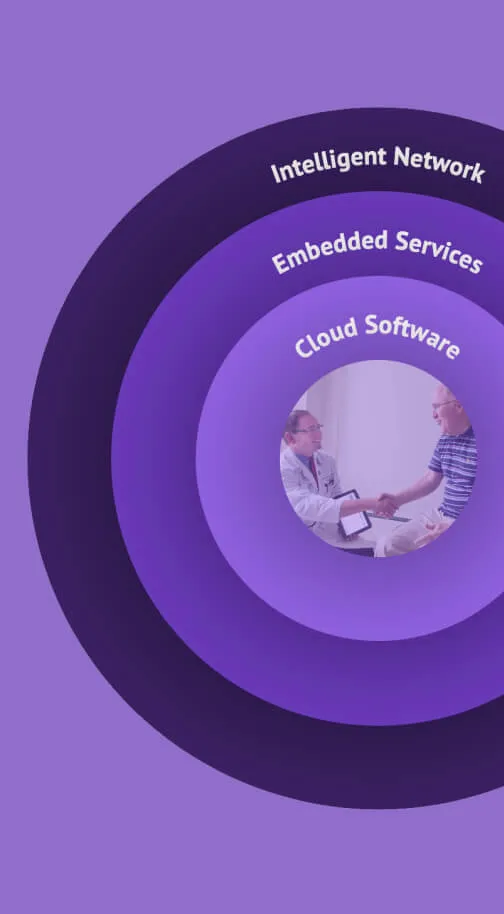Delivering meaningful behavioral health care starts with the right EHR tools
The demand for behavioral health care across the U.S. is high—and climbing even higher. But right now, it’s incredibly difficult to meet that demand. According to the U.S. Health Resources and Services Administration, there is currently a substantial shortage of behavioral health providers, and barriers such as reimbursement challenges and provider burnout make a difficult situation even tougher.1 How can technology support high-quality behavioral health care without becoming a burden itself?
Behavioral health practices need a healthcare IT partner that reduces administrative burden, enhances documentation efficiency, and maximizes their financial performance. athenaOne® for Behavioral Health was designed to help providers do all three. Our behavioral health EHR enables mental health therapists and all behavioral health providers to fully focus on what matters most: delivering meaningful care to their clients.
To accomplish this, we’ve included numerous tools and features created to support the unique needs of behavioral health practices. Let’s take them one at a time.
Designing tools that align with behavioral health specific workflows
For behavioral health providers, a typical EMR or EHR may not meet their needs right out of the box. Many available EHRs lack the necessary tools for behavioral health documentation, such as therapy notes, progress tracking, and standardized mental health assessments.
athenaOne® for Behavioral Health provides specialty-focused tools including tailored clinical documentation and visit layouts that follow the Data/Assessment/Plan format. Integrated treatment plans keep providers aligned with their clients’ progress, while built-in behavioral health screeners, such as CFARS, Hamilton Anxiety (HAM-A), and Hamilton Depression (HAM-D) support evidence-based care. By providing tools they can use instead of tools they have to work around and adapt to, athenaOne for Behavioral Health can help reduce the provider’s burden.
Improving interoperability for coordinated care
In behavioral health as in many other realms of medicine, the patient may have an entire team involved in their care. For instance, behavioral health providers and mental health counselors often collaborate with primary care physicians, addiction treatment centers, and social services. The better the interoperability among these entities, the better it is for coordinating care. It’s easier said than done.
athenaOne’s cloud-based platform enables efficient data exchange, giving providers full clinical visibility into a client’s care history across different healthcare settings. This integration helps behavioral health professionals work in tandem with other specialties to deliver holistic treatment and refer the client to additional care services. Unlike less sophisticated platforms, athenaOne also has ONC HIT certified capabilities, meaning that certified components of the product meet the U.S. Department of Health’s requirements and standards for technological capability, functionality, and security.
Streamlining documentation and workflows
Because behavioral health professionals such as mental health therapists often rely on narrative-based documentation, it can be cumbersome for them to adapt to an EHR that was designed for general medicine and a different style of documentation. Like writing with the “wrong” hand, using an EHR not tailored to their needs can slow them down and become a daily hindrance to efficient care delivery.
To smooth the path and enable faster, more efficient documentation, athenaOne for Behavioral Health offers workflow automation and pre-built, structured templates designed specifically for behavioral health providers. Treatment plans are embedded directly into the session note, while intuitive note-taking features simplify the complexity of documenting the encounter. The result: an EHR for mental health with faster, more efficient documentation that reduces the burden on providers.
By supporting various care models including individual therapy, group therapy, and IOP/PHP programs, our practice management software helps minimize administrative errors.
Optimizing billing and reimbursement processes
Some behavioral health encounters may be one-client, one-time experiences. But many others involve group therapy, multiple ongoing appointments, or enrollment in an intensive outpatient and partial hospitalization program. Behavioral health billing has complex rules for therapy sessions and group treatments, and an error made here can often result in a denied or underbilled claim.
To ensure that providers receive accurate reimbursement for services provided, athenaOne for Behavioral Health simplifies behavioral health coding and revenue cycle management. By supporting various care models including individual therapy, group therapy, and IOP/PHP programs, our practice management software helps minimize administrative errors.
Many behavioral health providers, including mental health counselors, are self-pay. athenaOne helps optimize financial performance by removing barriers to collect from clients. Its digital self-serve payment tools provide the convenience clients want, enabling them to view and pay their outstanding balance via the patient portal or the athenaPatient™ app. These tools are effective: athenaOne customers that use athenahealth’s online payment solutions have a 47% higher Patient Pay Yield2 and receive patient payments 10% faster3 than practices that don’t.
Supporting group therapy sessions
Group therapy is a valuable component of many behavioral health treatment plans. It comes with unique challenges from scheduling to documentation and billing—which an out-of-the-box EHR designed for solo patient encounters may not be able to accommodate. Group therapy workflows aren’t just nice to have, they’re oftentimes essential for successful behavioral health care delivery.
As an EHR with tailored workflows for this specialty, athenaOne for Behavioral Health is designed to fully support group therapy sessions, providing an easy-to-use interface for scheduling multiple clients, robust documentation tools for individual and group notes, and seamless billing support to ensure providers receive proper reimbursement. Instead of trying to make a group therapy encounter fit into a general medical EHR workflow, providers and staff can have a frictionless experience that accounts for the group and for each individual client within it.
Expanding patient engagement and access with telehealth
Regular, open, frequent communication is a must for many therapeutic provider/client relationships. Many EHRs offer limited engagement tools, but athenaOne enables convenient access and engagement through telehealth.
athenaTelehealth is an add-on service to athenaOne which allows providers to conduct HIPAA-compliant virtual visits. For clients who can’t attend in-person appointments due to lack of transportation, scheduling challenges, or other reasons, it provides access to the care they need from behavioral health providers. athenaTelehealth helps ensure continuity of care and supports the management of ongoing behavioral and mental health conditions, ultimately increasing both patient acquisition and satisfaction. Offering telehealth appointments in the behavioral health EHR also helps maintain schedule density, supporting financially healthy practice.
Simplifying adoption for behavioral health practices
Reviewing all of the benefits of athenaOne for Behavioral Health, you may be thinking, “This all sounds great in theory, but how would I implement something like this?” As with smaller independent medical practices, solo and mid-sized behavioral health practices often have limited IT support on staff and/or limited resources to hire a consultant to handle EHR software implementation for them.
As a cloud-based solution, athenaOne helps simplify the complexity of implementation. Storing information in the cloud instead of on locally installed servers reduces the need for costly infrastructure while maintaining security and data privacy for the practice. With its intuitive interface, athenaOne enables providers to quickly onboard staff, customize documentation preferences, and leverage ongoing support to ensure a smooth transition to digital recordkeeping.
Reduce your burden, deliver excellent behavioral health care
By addressing these critical issues, athenaOne for Behavioral Health is the EHR and practice management software solution that enables mental health counselors and all behavioral health providers to focus on delivering high-quality care while minimizing administrative burdens. Which of these challenges have you encountered in your behavioral health practice? Set up a meeting with our experts. We’re eager to help you focus on your clients and run a productive and healthy practice.
1. U.S. Health Resources and Services Administration, Nov. 2024. State of the Behavioral Health Workforce, 2024. Retrieved March 7, 2025 from https://bhw.hrsa.gov/sites/default/files/bureau-health-workforce/state-of-the-behavioral-health-workforce-report-2024.pdf
2. Based on athenahealth data as of Dec. 2024. Patient Pay Yield (PPY) is the percentage of patient balance collected within 6 months of the date of service; M046
3. Based on athenahealth data as of Dec. 2024; compares the number of days it takes practices to get paid with or without the use of athenahealth's online payment solutions; M047













